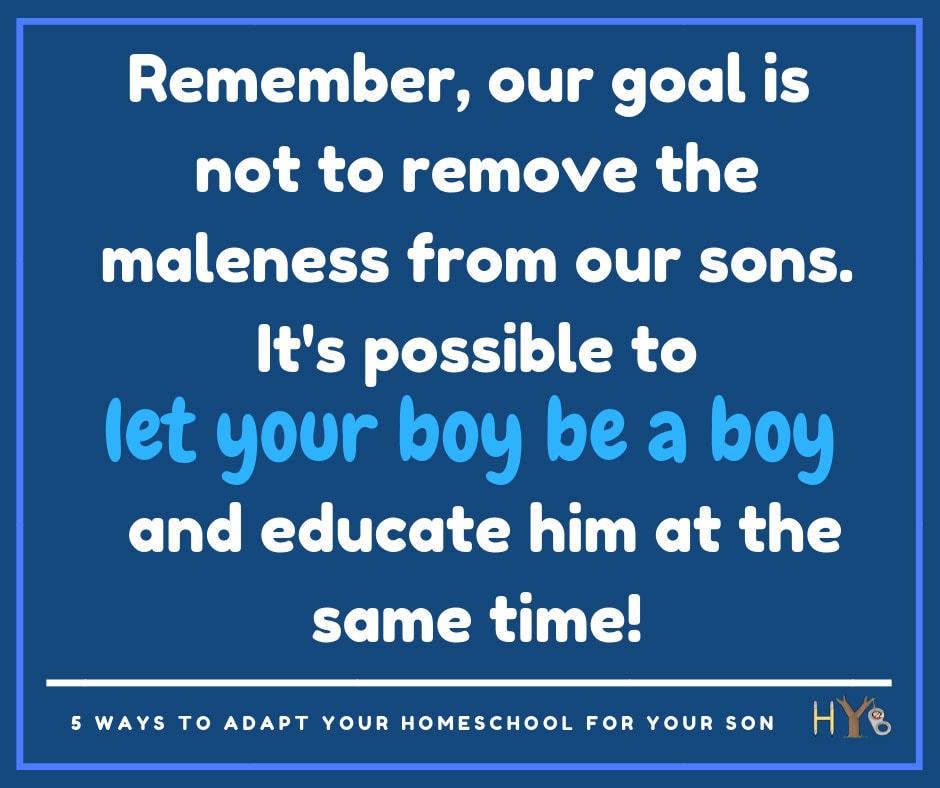Overview: Want to learn the best methods for boy education? Find out how to teach lessons so that boys will not only learn more but will also enjoy the process.
We all know that men and women are different. But did you know that God has made it so that men and women see differently, hear differently, and even think differently? Because of this, boys and girls learn in vastly different ways.

Many girls enjoy curling up on a window seat to fill out worksheets and read books. Ask a girl to write a story or to tell you about what she has learned and she will blossom. Ask most boys to do these things and you may find that they will rebel.
Especially if the worksheet is black and white and the book contains lots of long descriptions and little action.
So, how should we teach boys? Is it possible to help them love learning or should we resign ourselves to the fact that most boys hate school so they’re probably going to hate homeschooling as well?
There is hope!
Fortunately, there are ways we can teach lessons in our homeschools so that our sons will not only learn more but will also enjoy the process.
Here are 5 Ways to Adapt Your Homeschool for your Son:
1 – Consider letting him start later
Boys’ language and fine motor skills don’t develop as early as do girls. If you notice your son is struggling, you may want to delay teaching your sons reading and writing skills until they show more sign of being ready.
There are plenty of other learning activities you can do with your son that don’t involve him having a pencil in his hand.

2 – Let him move
Asking your son to sit still is one surefire way to tire him out and frustrate him. Rather than expecting our sons to sit at a desk for long periods of time, come up with lessons which will allow him to move around.
Physical play is essential for children’s fine and gross motor development and movement actually helps kids to learn better.
When you do want your son to sit down, consider giving him a body ball to sit on rather than a regular chair. Believe it or not, this type of chair which allows him to bounce and wiggle will allow him to concentrate better on whatever else you’re asking him to do.
In his book, Spark, John Ratey, M.D., says that physical activity increases levels of the neurotransmitters dopamine and norepinephrine the same way that ADHD medications do. Both of these chemicals play a large role in increasing focus and attention in our kids.
3 – Incorporate hands-on activities
Boys learn best with hands-on activities and those which incorporate their whole bodies. Building a bridge out of popsicle sticks will teach them so much more than merely reading a book about bridges.
Also, when you do want your sons to sit and listen, give them something mindless to do with their hands. Allow them to doodle. Give them stretchy string, Wikki Stix, or squeeze balls.
Not having to focus on staying absolutely still will conserve your sons’ energy for focusing on the lesson.
4 – Choose books boys enjoy
Boys love books with lots of action. They often enjoy science fiction, mysteries, and other fast-paced books. Rather than choosing books that we remember reading when we were kids, moms may need to mine the brains of our husbands to find books our boys will enjoy.
There are also many lists on the internet which list books that boys will enjoy. Also, let your son read his book up in a tree, down by the creek, or snuggled in bed under a blanket with a flashlight. 🙂
→ Related Content: 10 Tips for Teaching Teenage Boys5 – Make it fun
Boys appreciate a sense of humor. Try not to be too serious while you’re teaching your lessons. Inject some surprises. Laugh at your son’s jokes.
There’s a time and a place for seriousness; but, it can be easy for us moms to be so concerned about our children’s education that we make their lessons dry and somewhat boring – especially in the eyes of our boys.

Remember, our goal is not to remove the maleness from our sons. It’s possible to let your boy be a boy and educate him at the same time!
Boys find learning enjoyable when we use the right approach. If you’re finding your sons are objecting when you’re trying to teach them, try incorporating some of the above tips into your homeschool and watch them develop more positive attitudes about their studies.
Do you have any suggestions to add? How have you adapted your homeschool for your son? Please leave a comment below!
Originally written for Proverbial Homemaker. Reprinted with permission.



I’d love to hear ideas for adapting to the male mind for 11th and 12th grade boys.
Yes, actually I have written posts about teaching older boys:
– 10 Tips for Teaching Teenage Boys
– 8 Ways to Keep Learning Fun for Teens and Tweens
– Our Grand Experiment: The Power of Choice for our Kids
Let me know if you have any other questions. I’m always open to post suggestions! 🙂
Hey, Melody, just wanted to be sure you saw Darlene’s advice to you in this thread. 🙂
For older boys, a balance independent school work and classes with others, opportunities for service and leadership, manual labor like yard work, hard exercise like running. So far, those things seem to be helping with the high school years—
Excellent advice! Thanks for sharing that with us.
Melody, I homeschool 4 tween/teen boys. The oldest graduated last year and another one this year. I loved school and hoped my boys would too. I almost lost my relationship with my oldest due to my unreasonable exceptions. I was too much teacher and too little Mom. Since that difficult experience, I have focused on a solid, traditional education in their younger years and then transition them into the real world as soon as possible rather than focusing on building their high school transcript. We encourage them to volunteer and do internships and to get a license and a job as soon as allowed by law. Spending time in the real world has done more to create a desire for continuing education than my 13 years of encouraging – I suppose they would call it nagging:) My husband and many of our family members work in construction and farming. They are good, honest men who work hard and provide well, but aren’t highly educated in the traditional sense. Family of origin does influence teen boys and their attitude toward education much more than you do. After a year of working full time, our oldest did decide to go to college. He is working to pay his own way and doing well in his classes. Since he understands the value of the diploma, he is motivated from within to do well. The difficult decision to allow him to pursue his interests his way rather than forcing him to take a more traditional route saved our relationship and seems to be working with the next three as well. He tested at level with his peers and has no trouble keeping up academically even though he had an untraditional high school. I am convinced young men were not meant to be in a classroom with a woman teaching them until 18. Pray hard and take any advice your husband gives!
Michele, I have truly benefited from your advice through the years. Thanks so much!
That’s excellent advice, Darlene. Thanks so much for taking the time to share that with us! And thank you for your kind words about my site. I appreciate that so much.